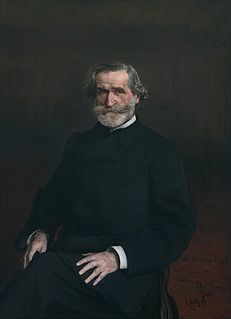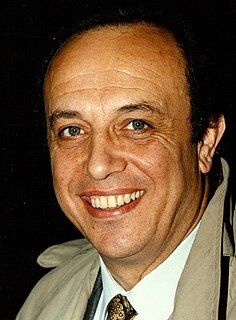See also
- Giuseppe Verdi's Rigoletto Story , a 2002 film version of the opera
- Rigoletto... in Bluegrass , a 2006 Canadian film
Rigoletto is an 1851 opera in three acts by Giuseppe Verdi.
Rigoletto may also refer to:

Giuseppe Fortunino Francesco Verdi was an Italian composer best known for his operas. He was born near Busseto to a provincial family of moderate means, receiving a musical education with the help of a local patron. Verdi came to dominate the Italian opera scene after the era of Gioachino Rossini, Gaetano Donizetti, and Vincenzo Bellini, whose works significantly influenced him.

Il trovatore is an opera in four acts by Giuseppe Verdi to an Italian libretto largely written by Salvadore Cammarano, based on the play El trovador (1836) by Antonio García Gutiérrez. It was Gutiérrez's most successful play, one which Verdi scholar Julian Budden describes as "a high flown, sprawling melodrama flamboyantly defiant of the Aristotelian unities, packed with all manner of fantastic and bizarre incident."

Rigoletto is an opera in three acts by Giuseppe Verdi. The Italian libretto was written by Francesco Maria Piave based on the 1832 play Le roi s'amuse by Victor Hugo. Despite serious initial problems with the Austrian censors who had control over northern Italian theatres at the time, the opera had a triumphant premiere at La Fenice in Venice on 11 March 1851.

Francesco Maria Piave was an Italian opera librettist who was born in Murano in the lagoon of Venice, during the brief Napoleonic Kingdom of Italy.

Luisa Miller is an opera in three acts by Giuseppe Verdi to an Italian libretto by Salvadore Cammarano, based on the play Kabale und Liebe by the German dramatist Friedrich von Schiller.

Leo Nucci is an Italian operatic baritone, particularly associated with Verdi and Verismo roles.

Giuseppe Verdi's Rigoletto Story (2005) is a film version of Giuseppe Verdi's 1851 opera Rigoletto. Filmed in Siena in 2002, it was directed by Gianfranco Fozzi and produced by David Guido Pietroni and Maurizio De Santis distributed worldwide by Columbia TriStar Home Entertainment and Sony Pictures Home Entertainment.

Giuseppe Taddei was an Italian baritone, who, during his career, performed multiple operas composed by numerous composers.
"La donna è mobile" is the Duke of Mantua's canzone from the beginning of act 3 of Giuseppe Verdi's opera Rigoletto (1851). The canzone is famous as a showcase for tenors. Raffaele Mirate's performance of the bravura aria at the opera's 1851 premiere was hailed as the highlight of the evening. Before the opera's first public performance, the aria was rehearsed under tight secrecy: a necessary precaution, as "La donna è mobile" proved to be incredibly catchy, and soon after the aria's first public performance it became popular to sing among Venetian gondoliers.

Rolando Panerai was an Italian baritone, particularly associated with the Italian repertoire. He performed at La Scala in Milan, often alongside Maria Callas and Giuseppe Di Stefano. He was known for musical understanding, excellent diction and versatile acting in both drama and comic opera. Among his signature roles were Ford in Verdi's Falstaff and the title role of Puccini's Gianni Schicchi.

Giuseppe Valdengo was an Italian operatic baritone. Opera News said that, "Although his timbre lacked the innate beauty of some of his baritone contemporaries, Valdengo's performances were invariably satisfying — bold and assured in attack but scrupulously musical."

Karl Gustaf Ingvar Wixell was a Swedish baritone who had an active international career in operas and concerts from 1955 to 2003. He mostly sang roles from the Italian repertory, and, according to The New York Times, "was best known for his steady-toned, riveting portrayals of the major baritone roles of Giuseppe Verdi — among them Rigoletto, Simon Boccanegra, Amonasro in Aida, and Germont in La traviata".

Scipio Colombo was an Italian dramatic baritone, and was known for his abilities as a musician and singing-actor.
Giuliano Bernardi was an Italian operatic baritone and tenor.
This is a list of recordings of Rigoletto, an 1851 opera by Giuseppe Verdi with an Italian libretto by Francesco Maria Piave based on the 1832 play Le roi s'amuse by Victor Hugo. It was first performed at La Fenice in Venice on 11 March 1851.

Lodovico Graziani was an Italian operatic tenor. According to John Warrack and Ewan West, writing in The Oxford Dictionary of Opera: "His voice was clear and vibrant, but he lacked dramatic gifts." He is now mainly remembered for having created the role of Alfredo Germont in the world premiere of Giuseppe Verdi's La traviata in 1853.
In opera, a banda refers to a musical ensemble which is used in addition to the main orchestra and plays the music which is actually heard by the characters in the opera. A banda sul palco was prominently used in Rossini's Neapolitan operas. Verdi used the term banda to refer to a banda sul palco, as in the score for Rigoletto. He used the term banda interna, to refer to a band which is still separate from the orchestra but heard from the off-stage wings. The early scores of La traviata use a banda interna.
Ayres Borghi-Zerni was an Italian operatic soprano who had a distinguished international career from 1914 till 1928.

Rigoletto or Rigoletto and His Tragedy is a 1956 Italian musical melodrama film written and directed by Flavio Calzavara and starring Luciano Tajoli and Jula De Palma. It is based on the 1851 Giuseppe Verdi opera Rigoletto and incorporated music from that work.
"Caro nome che il mio cor", or "Caro nome" for short, is an aria for coloratura soprano from Act I of Verdi's opera Rigoletto.